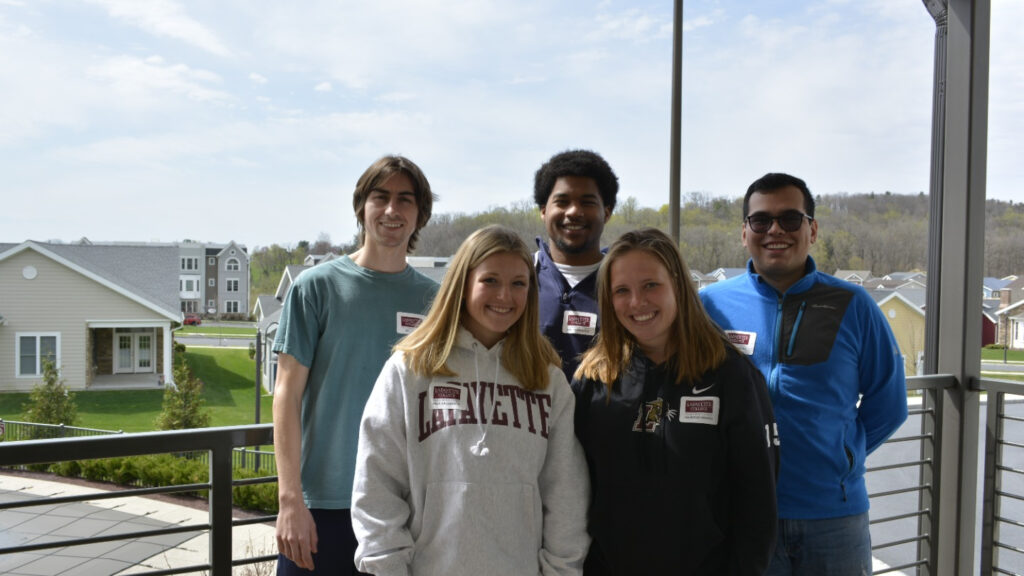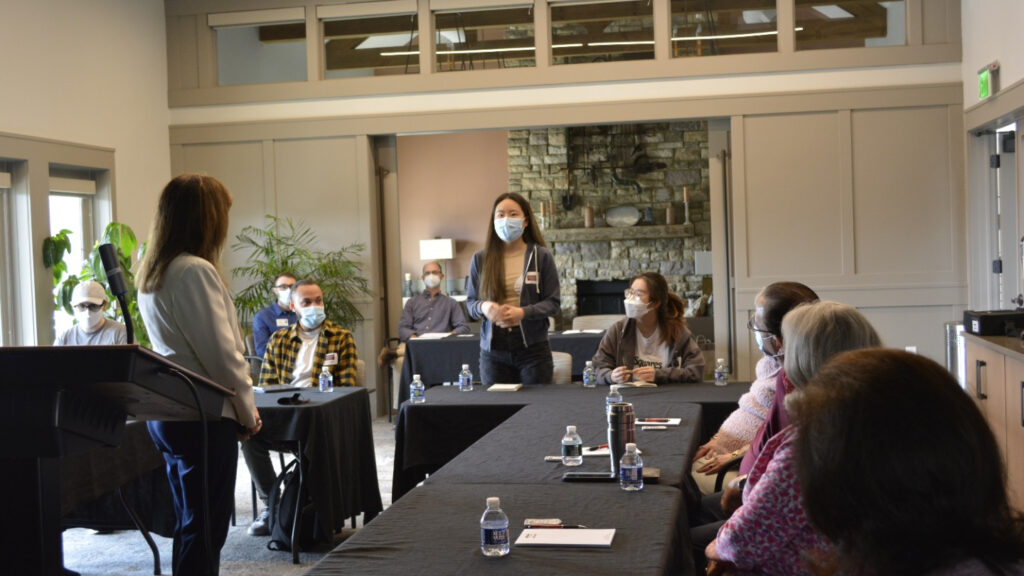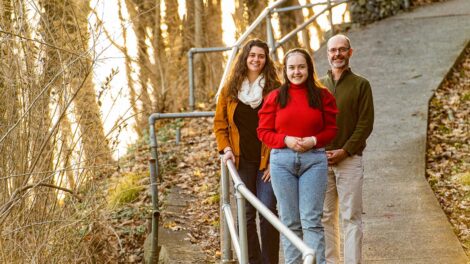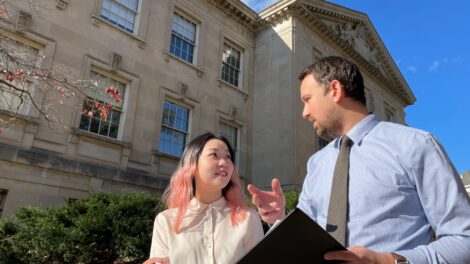Students help senior living organization develop marketing strategy
By Bryan Hay
A nonprofit organization that operates retirement communities in the Lehigh Valley turned to Lafayette College’s Economics Department to develop market research as it considers building a facility in an urban setting.
Over the course of the spring semester, students in Prof. Christopher Ruebeck’s Marketing Research class assisted Morningstar Living, which operates Heritage Village in Upper Nazareth Township and Moravian Hall Square in Nazareth, in preparing and delivering a detailed report that draws on data from many sources, including prospective clients, the census, and local building information.

One of the Lafayette marketing research teams at Heritage Village. Back row (L-R): Will Macy ’22, Adolfo Sanchez ’22, and Julian Fandino ’22. Front row: Shea Balderson ’23 (left) and Felicitas Hannes ’23)
Ruebeck and his Lafayette class joined with students from Moravian University as part of the Lehigh Valley Research Consortium (part of the Lehigh Valley Association of Independent Colleges organization), which combines the expertise of researchers at Lehigh Valley colleges and universities with community partners to examine economic, social, health, environmental, and political issues and solutions. It also provides undergraduate and graduate students the chance to do hands-on research.
Ruebeck, associate professor of economics, says the project afforded his students valuable opportunities to discuss survey design, statistics, and other areas related to econometric techniques.
“It’s a cool thing that students had to think about something that they might not have thought about otherwise,” he says, noting that the project dealt with questions and circumstances around aging and the kinds of services seniors desire when considering a retirement facility.
“Some of the students have connections to a grandparent who lives in a retirement community or to a family business connected to this industry, but in general this is an area that many college students haven’t thought much about,” Ruebeck says.

Lafayette students presented at a focus group session
In addition to researching and presenting information from existing sources, students at both schools also helped prepare a variety of closed and open-ended questions asking participants in the focus groups organized by Morningstar about the types of amenities they’d like to have in a retirement facility, from cafés and retail options to health and wellness facilities. Queries also included preferences for urban or suburban settings and mixed-age living.
Respondents indicated that they’d like to be able to walk to amenities such as restaurants that are typical in a downtown setting and live in a mixed-age environment, which would also be available in an urban area. But respondents also expressed a strong preference to be in a suburban setting.
Noting the eagerness of focus group participants to share ideas, the Lafayette report suggested that Morningstar consider adding additional methods for collecting data, including online questionnaires.
Offering a private platform to submit comments also may prevent respondents from changing their mind based on influences from the dynamics and comments made by others in the room, the report said.
“Even though, as a psychology major, I have been in data collecting several times, it is a novel experience for the majority of the class,” says Wenxin (Cyndia) Chen ’22. “Each session of data collection is different. By talking directly to the participants, I could fully understand their intentions, rationales of action, and forecast of the Morningstar campus.”
Chen was surprised by the level of passion displayed by members of the focus groups and their willingness to stay and chat after the sessions ended.
“Seeing their enthusiasm also prompts my passion for the project,” Chen adds. “From the session, I recognize that it is more than a project, but people’s expectation on changes to be made in their future houses.”
Shea Balderson ’23 says she enjoyed the project because it was a hands-on opportunity, “a real project.”
“We actually did something that helped an organization develop strategy,” she says.
“We learned so much about data collection and how to form questions in a meaningful, but not confusing, way,” says Felicitas Hannes ’23. “It was interesting to see how participants responded to our questions, real people expressing their wishes about a retirement community.”
Chen adds, “I could see the direct impact of the focus group and the practical influence on Morningstar. The two elements I enjoyed the most are the availability to talk to participants directly and the feeling that what I did could improve the community.”
At conclusion of the research project, Morningstar Living’s chief sales and marketing officer, Sue Capobianco, commented, “Morningstar Living is committed to collaborating with educational partners to provide experiential learning opportunities for students. This research project created a way for students to immediately apply knowledge from their Marketing Research class to our business needs. It truly was a win-win … a powerful way of learning for students, and completed market research for Morningstar Living.”

